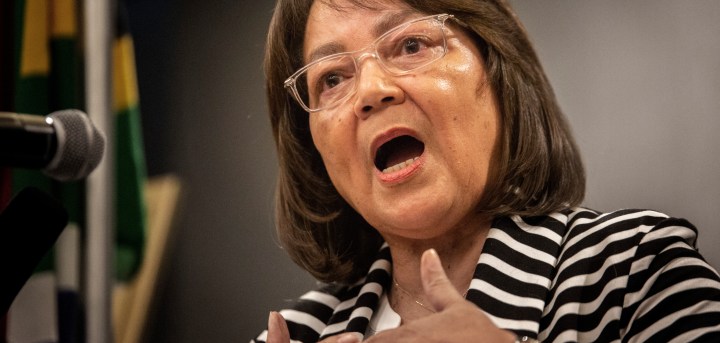ANALYSIS
De Lille’s new party must work overtime to win risk-averse Western Cape voters

The Western Cape is a provincial anomaly in South Africa. It is the only province where black Africans do not make up the majority of the population – instead, most inhabitants of the Western Cape are coloured South Africans. It is also the only province which returned the National Party to power after 1994’s first democratic elections. These are factors which may play both to the advantage, and disadvantage, of veteran politician Patricia de Lille’s new party.
Long-brewing speculation has now been confirmed. Patricia de Lille is set to launch her fourth act in South African politics: from the Pan-Africanist Congress, to the Independent Democrats, to the Democratic Alliance, and now to her second attempt at an independent party.
There is no other politician in South Africa who has undertaken these floor-crossing acrobatics with such success. There are other MPs who have crossed the floor, of course.
Other than ANC leaders who have created breakaway parties – of whom Mosiuoa Lekota and Julius Malema have had the most impact – there are also figures like Juli Kilian, a former New National Party member who became a Cope MP and then an ANC MP, with the DA also claiming that Kilian approached the blue party before committing to the ANC. There are also a raft of former NP figures who found homes in both the ANC and the DA.
But nobody except De Lille has managed to take on significant leadership roles in four separate political parties – an accomplishment which speaks to De Lille’s Teflon-like qualities in the public space and to her significant political nous.
What it also speaks to, as her detractors point out, is a politician seemingly not wedded to particularly firm ideological positions.
It is hard to imagine more surreal bedfellows than the old PAC and the current DA. As a PAC MP in the mid-’90s, De Lille’s ideal of racial reconciliation was amending the old party slogan “One settler, one bullet” to “One settler, one plane ticket”. If anyone had told you then that De Lille would end up sharing a bench with the DA as Mayor of Cape Town, you would have thought them mad.
So what exactly will De Lille’s as-yet unnamed new party stand for?
That’s not yet clear. De Lille told Daily Maverick on Tuesday that she intends to unveil both the name of her party and its policy positions at an event next week.
On the basis of her announcement on Sunday, however, it is clear that a fundamental tenet of the new party’s identity will be differentiating itself from the DA. In particular, it is likely that De Lille and the five other DA councillors who quit the party alongside her will continue to paint the DA as a racist organisation in which South Africans of colour cannot ever truly be at home.
De Lille as a vocal anti-racism mouthpiece is on safe ground. She can justifiably claim that this issue has been a golden thread underlying all her political activism. She will point, for instance, to the fact that it was at her behest that Cape Town launched an anti-racism campaign while she was mayor.
On other issues, however, De Lille is likely to face a dilemma: how far can she differentiate her new party’s economic positions from those she enthusiastically espoused as Cape Town mayor?
On Sunday, De Lille painted her ousting from the DA as motivated by the party’s antagonism to her attempts to improve service delivery for the poor and transform Cape Town’s ongoing spatial apartheid challenges.
But it is a matter of public record that De Lille rubber-stamped a number of controversial private developments in Cape Town’s city centre, contributing to the city’s growing unaffordability. The DA’s controversial Bowman’s Report, meanwhile, alleged that De Lille prevented Cape Town’s Bo-Kaap from being declared a heritage area – a claim which has caused outrage from groups such as the Muslim Judicial Council.
De Lille will need to play it safe on matters like these, because at every point the decisions she made as Mayor of Cape Town can be scrutinised for evidence of hypocrisy.
Announcing the launch of her party, De Lille also emphasised the role that the youth will play in the new formation, and condemned the practice of “recycling candidates” undertaken by other parties. The obvious problem here is that De Lille is 67 years old herself, and the five former DA councillors who are known to be joining her new party are not particularly youthful either.
Youthful politicians, by definition, are also unlikely to have the necessary brand-recognition power that De Lille will be seeking to raise her new party’s spotlight. The fact that she intends to contest all nine provinces nationally means De Lille will be in dire need of strong figures elsewhere in the country – yet all her known allies so far are virtually anonymous outside of the Western Cape.
But arguably superseding all other challenges are the two real doozies: time and money.
Julius Malema’s EFF launched in 2013 and managed to win just over 6% of the national vote in the 2014 elections – but they had a good four months on De Lille’s launch. And since South Africans have a tacit national pact to forget all about politics during December, De Lille can only hope to begin making any real headway on her campaign in January 2019.
That leaves less than four months in which to carry out the work necessary to establish a party’s footprint on a national level: creating branches, fostering activists at the grassroots level, and campaigning all over a very large country.
It is also a hellishly expensive business. In the run-up to the 2016 local elections, both the DA and the ANC surpassed the R100-million mark in their campaigning costs. Even the EFF, which relies heavily on community activists, reportedly spent over R10-million and were forced to seek a loan near the end of the campaign.
On Sunday, De Lille said she was investing her “own money” in the party. But unless De Lille is sitting on a veritable fortune, which alone would raise eyebrows given that her entire career has been spent in politics, her own money will not take her far.
The EFF had a patron with deep pockets in the form of tobacco smuggler Adrian Mazzotti, who paid the party’s election deposit. De Lille will need similarly wealthy backers – though in her time as Mayor of Cape Town interacting with the city’s property developers, she may have made many.
The Institute of Race Relations’ Gareth van Onselen pointed out on Twitter that even to carry out basic polling – of the kind De Lille says she has already done to confirm her decision to launch – can cost between R500,000 and R1-million per poll.
De Lille told Daily Maverick on Tuesday that she intends to undertake two further rounds of polling in the weeks to come.
Finally, there has been much made of the Western Cape’s “coloured vote”: a term which is cited so frequently and so vaguely that it has almost no meaning. The idea already being parroted by some pundits is that De Lille will win the “coloured vote” from the DA in the province, as this demographic is taken to be particularly irate at De Lille’s treatment by the DA.
While voting along racial lines is nothing new in South Africa, history suggests that it would be a mistake to think that the Western Cape’s coloured population can be so reflexively swayed by questions of identity. It is worth remembering that the Western Cape was the only province in South Africa to return the National Party to power in 1994. And while younger voters may be more progressive than their parents, the Western Cape continues to be the province in which the EFF holds least sway.
Over the course of the five general elections since 1994, Western Cape voters have revealed themselves to be extremely risk-averse at the polls. Besides the ANC and the DA, the only party to outstrip 10% was the New National Party over a decade ago.
Attempts to win the legendary “coloured vote” in the province by making specialised appeals on the basis of race have failed to gain much traction in the past, as the experience of Pieter Marais and Gayton McKenzie should show.
Of course, De Lille has a massive advantage in the form of her tenure as mayor, which has made her the best-known figure in Western Cape politics other than Helen Zille.
De Lille’s familiar face on the ballot paper is the single greatest asset the party has going for it at present – but at this time, in this country, that’s unlikely to be enough. DM


















